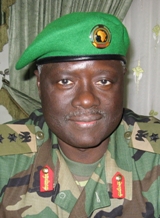AU confirms bombing raid on Darfur town
October 9, 2007 (KHARTOUM) — Sudan’s army bombed Muhajiriya, the main Darfur town held by the only rebel faction to sign a 2006 peace deal with Khartoum, injuring at least two dozen people, the African Union force commander said on Tuesday.

“Yesterday … I was informed that there was some bombing and military activity in the area of Muhajiriya,” he said of the raid which is a violation of a U.N. Security Council resolution that banned Khartoum from offensive flying.
Agwai said civilians converged on the nearby AU base for safety. His troops treated about two dozen injured civilians and combatants but did not allow them to enter the base.
The town, in South Darfur, is held by the Sudan Liberation Army faction led by Minni Arcua Minawi who signed a May 2006 peace deal and joined the Khartoum government.
His group called the attack a “stab in the back of the Darfur peace agreement”.
On Sept. 29, the AU base in nearby Haskanita was attacked and destroyed, killing 10 peacekeepers in an escalation of violence ahead of peace talks due to being on Oct. 27 in Libya.
Rebels were suspected of being behind the attack on the AU base. Government and rebels who rejected last year’s peace deal were engaged in sporadic clashes in Haskanita, which is not far from Muhajiriya.
“It is sad that as we are looking forward to Libya that people have engaged themselves in this activity causing destruction and loss of lives,” Agwai said.
“I just hope that all of us will lay down our arms and work together to find a comprehensive peace agreement.”
TALKS IN JEOPARDY
Analysts said the fact that rebel factions were suspected of attacking the AU Haskanita base gave Khartoum cover for an offensive to garner as much land as possible before the talks.
“The uphsot of this strategy, of course, is that it becomes more difficult by the hour for any rebel faction or leader to show up in Sirte, Libya in 19 days,” said U.S. academic Eric Reeves.
“Khartoum will of course show up in Gaddafi’s home town, and make much of the fact that ‘the rebels refuse to negotiate’.”
British Minister for Africa Lord Mark Malloch Brown said if rebel leaders do not go to the talks, they abdicate their right to represent the people of Darfur.
“If they opt out, they should understand the consequences of doing that – probably their role in the peace negotiations may be finished,” Malloch Brown told the BBC.
Agwai said the AU had wanted to reopen the Haskanita base as quickly as possible, but an assessment mission showed the base had been entirely looted which would delay that.
The AU had asked the government to secure Haskanita to help find almost 60 missing AU peacekeepers while the force was evacuated after the attack leaving no international observers.
All but one peacekeeper was found, but the United Nations confirmed the formerly rebel-held town had since been burnt to the ground and all 7,000 civilians fled.
Suleiman Jamous, a respected humanitarian coordinator for the Sudan Liberation Army, said 105 people died in Haskanita.
Mostly non-Arab rebels took up arms in early 2003 accusing Khartoum of neglect. Khartoum mobilised militias to quell the revolt, who now stand accused of war crimes.
The International Criminal Court has issued arrest warrants for a junior government minister and allied militia leader accused of conspiring in war crimes in Darfur.
Khartoum refuses to hand them over and blames Western media for exaggerating Darfur’s conflict.
(Reuters)
